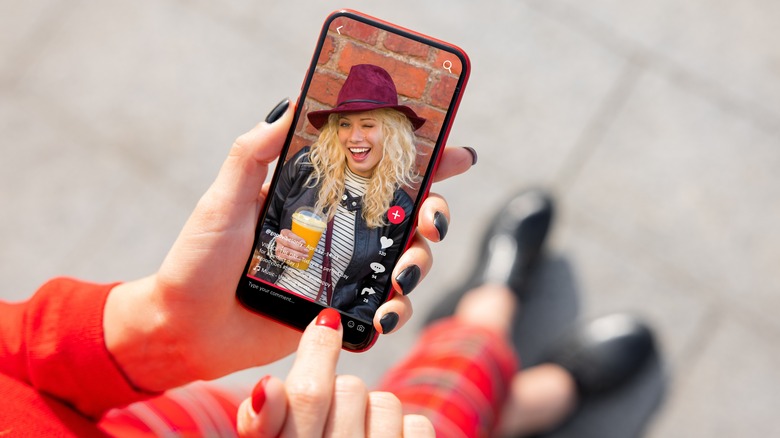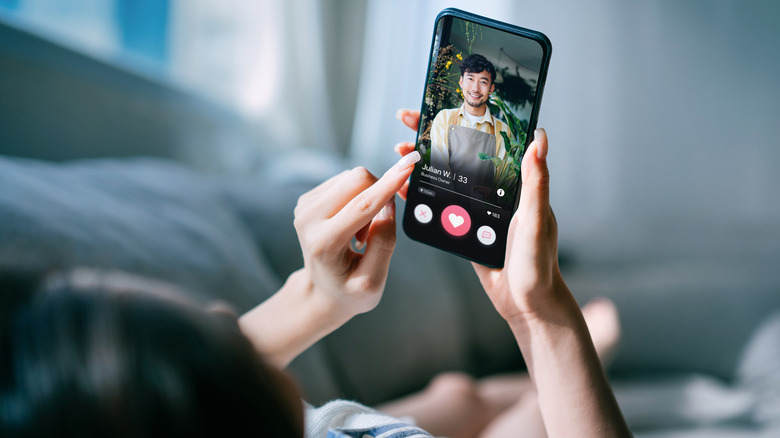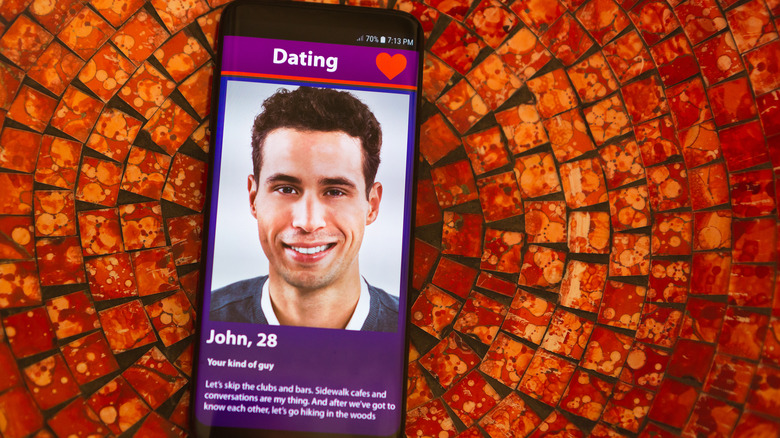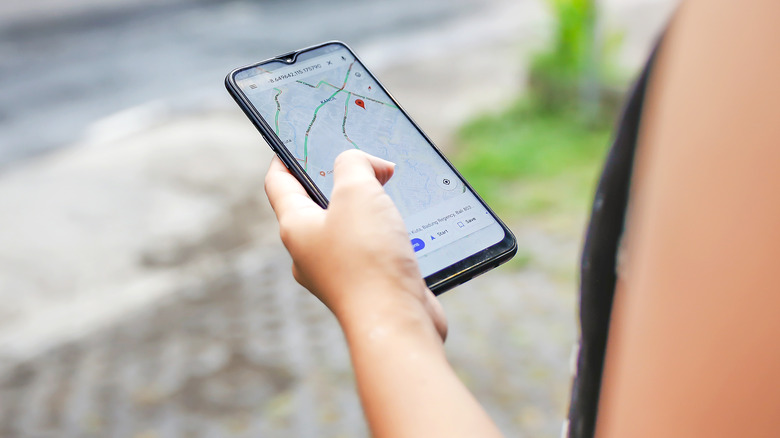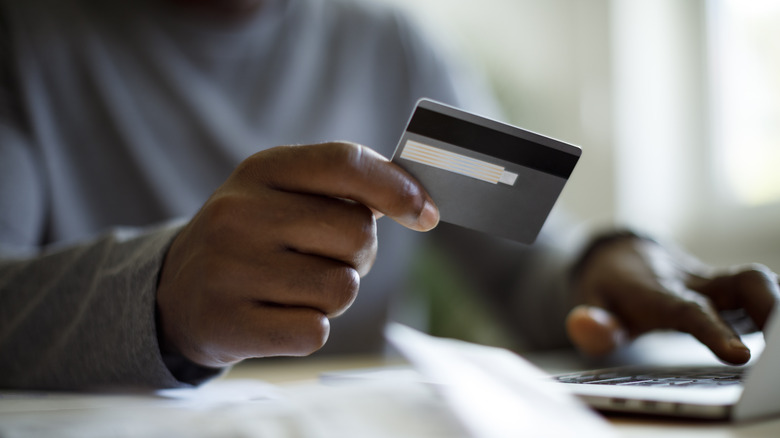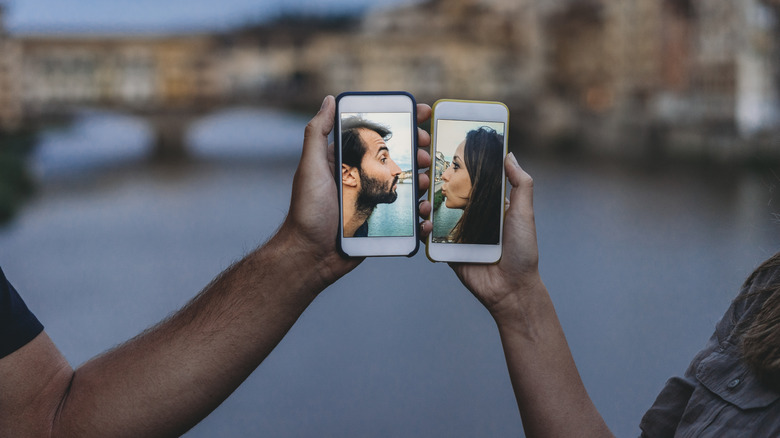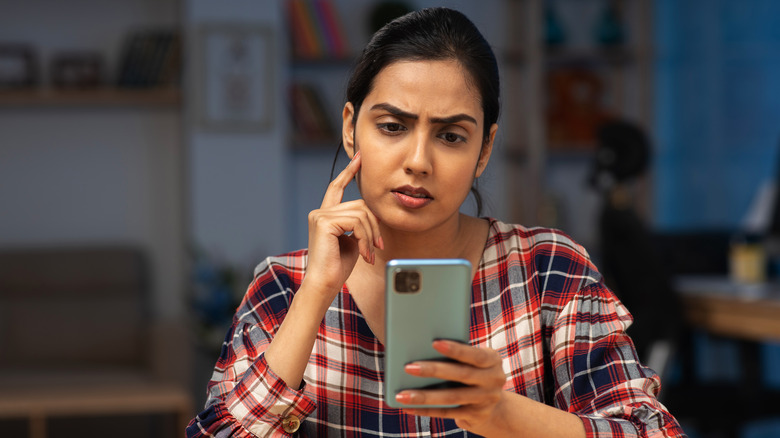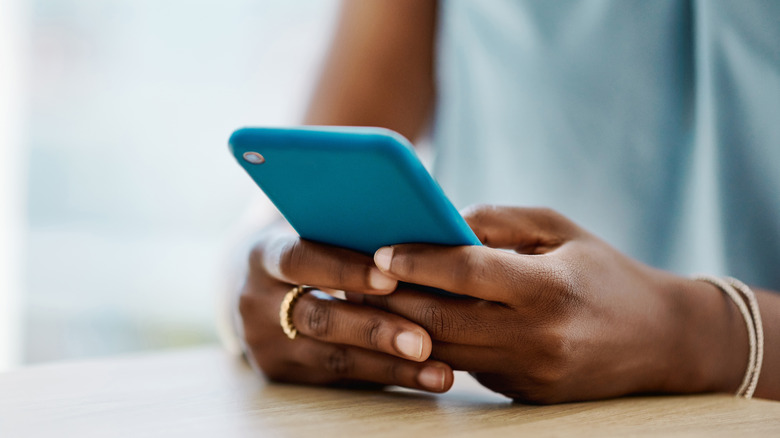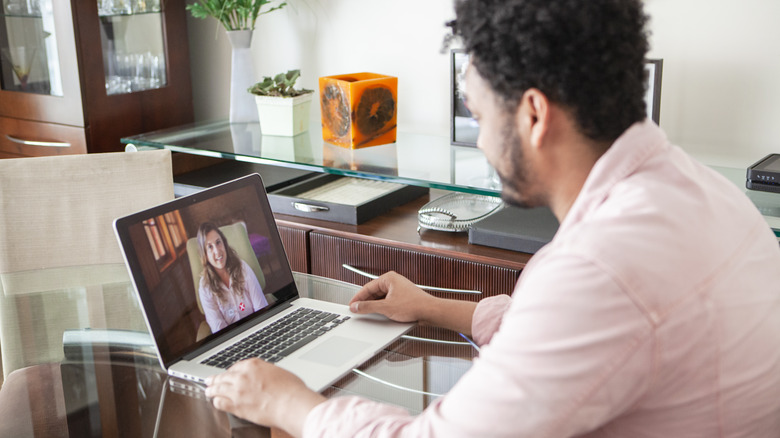12 Ways To Prioritize Your Safety On Dating Apps
Dating apps are a go-to for many when it comes to looking for love. Unfortunately, there are a lot of people out there who don't have the best interests of others in mind. Per one 2020 study of dating app users by Pew Research Center, nearly one-third of women reported experiencing harassment while on various dating platforms. On top of that, apps can serve as a potential breeding ground for scammers, whether they want money, are just trying to catfish you, or something worse.
Still, although dating apps give people with ulterior motives one more place to find victims, that doesn't mean you need to write them off completely. You just need to take extra precaution to keep yourself safe while looking for love. Plus, let's not forget there are risks even if you meet someone at the bar or the grocery store. Dishonesty in dating apps still keeps some away from this form of finding a partnership, but you can heed some advice that may make things go smoother. From being careful about how much you share about your personal life in the beginning to recognizing the signs of someone out to scam people, we have some tips to make things easier and keep you out of the path of online dating predators.
Don't connect to your social media accounts
Social media apps are those places where most of us share far too much personal information about ourselves. Apps like Facebook and Instagram encourage us to share inner parts of our lives, from photos of our home and children to our favorite spots to hang. While we're not telling you to drop all social media, there are some things you should keep separate from those services, and that includes your dating apps. Even though many apps will allow you to connect your socials to your dating page, some experts warn that linking accounts can open you up for having your data compromised by hackers. This is especially the case if you use the same password for all accounts.
To protect yourself, keep your Instagram private and only allow followers you know and trust. However, if you're an aspiring influencer, this may not work to your advantage. The same goes for posting stuff on Facebook so that only friends can see it and not the general public.
Take a fresh new photo (and don't use it anywhere but dating sites)
Many would likely agree that using reverse image search to look up people you meet online or offline is a fun hobby, even for innocent folks. Reverse image search is a great tool to use if you want to find out if someone is using your image without permission. However, the tool also has some downsides. People who come across your photo on a dating app can potentially screenshot it and use the search feature to track you down in other places, even if your account isn't linked to any social media.
So how can you prevent people from using this internet feature to find you? First, make sure the photos you upload to your dating app profile can't be found anywhere else on the internet; this includes social media like LinkedIn or Instagram. It's a smart idea to stage a photoshoot specifically for dating app photoshoot. Try and wear an outfit that isn't automatically recognizable. For instance, don't share any photos of you in a work uniform. Be mindful that if you're wearing same hairstyle and outfit as you are in other photos, it may still pop up in a reverse image search.
Use a nickname and be careful how much personal info you share
Here is some conflicting information you'll find online about safety on dating sites — some argue you shouldn't share your real name, at all, and others say you shouldn't withhold it because that looks deceiving. Many would agree with the latter – Nearly one-fourth of all people on dating apps share their full name.However, some experts would agree it's wisest to share your true first name and keep your last name to yourself until you meet someone a few times and really trust them. Of course, if you also don't feel comfortable sharing your first name, pick a nickname that you've had sometime in life. If it's a name you've regularly been called or used, it will come off less sketchy when you are ready to share the facts with your dating app match.
Along with keeping your last name to yourself, be mindful of other personal information you share via your profile or photos. For instance, it may be best to leave out where you hangout, such as a local bar that's very distinct and popular. It's okay to share your hobbies, interests, and field of work, but you shouldn't share your exact location or which company you work for.
Watch those location permissions too
Speaking of locations -– some dating apps have the ability for you to see each other's locations. This makes it easy to meet someone if you're already out on the town and ensures you're finding people nearby. And, just like Facebook's ability to tell you which of your friends is a block away, so too can some of these location-based dating apps. Although this can be helpful for narrowing your dating pool, and in a way, prevent you from being scammed by someone miles away, it can be concerning to let people know when you're in the same grocery store they are.
This is why it's important to be sure to do a little research for each app and limit those permissions. If you can't figure out where in the app itself to make these changes, go into your smartphone's app settings and turn off location recognition there. If you have a friend on the same dating app, you can ask them to check your profile and make sure that you're not searchable via location.
Don't fall for money scams
If you enjoy streaming television shows and movies, you've probably seen at least one ad on romance scams. It's not far off from the reality for those who date online. Per the Federal Trade Commission, it's estimated that upwards 70,000 individuals had been scammed out of money by someone on a dating app in 2022. One of the most common forms of these scams involves someone pretending to be romantically interested in someone, only to ask for money from them. This tends to happen in long-distance romances; a person may claim to be living in another country for work, but their home is in your hometown. If your profile says you're open to long distance dating, a person may be more inclined to take advantage.
While the request for money is in itself a red flag, how a person requests money raises many more. Romance scammers will typically tell you exactly how they need the money transferred to them, and some will even ask for gift cards rather than a wire transfer or Cash App payment. Above all, never give anyone money or access to your money through a dating app. Instead, block them and move on.
Don't move too fast
When you start talking to someone through a dating app and things seem to click right away, it's tempting to give them your phone number or schedule a date right away, but that's also not the best thing to do.
It's important to take some time to get to know this person and get a feel for who they are — and a few text chats back and forth isn't enough to get a feel of someone. While you don't want to give too much info away about yourself, you do want to ask them some things you'd also be willing to share. Ask about children, what they're looking for in a relationship, past relationships, if they have a steady job, and how busy that steady job keeps them. Get the details on the baggage they're carrying, as that can sometimes determine how well your time with them will be. Someone with a lot of baggage may take some extra work to find happiness in balance in a relationship.
Don't move from using the dating app as your means of communication too soon. Don't plan an in-person meeting too soon. But, most importantly, trust your gut if something feels off. If they change stories, withhold certain information that isn't too personal, or don't respect your boundaries when it comes to what you're willing to share, this may not be the right match for you.
Do a little research on the person
Depending on how much info you have on this person, you can do a little background research on them. Of course, this may not be a possibility until you yourself have warmed up to them enough to share more personal information as well. From looking them up on social media to doing a background check on whether they've been to jail or are on the sex offender registry list, the internet gives us a lot of ways to look into people before we invest our hearts in them.
If you don't have a last name, there are still ways to confirm someone's history. RAINN recommends using an app like GARBO, which allows you to look up a person's criminal record with just a last name and phone number. You can also check social media, too. Many women who live in the same city have taken to Facebook groups to share their dating experiences with different guys on the apps. Though it's important to be respectful of people's privacy, these online forums can help signal if someone has a history of abuse, harassment, or any other red flag behavior.
If you do have their complete name, you can check out sites like LinkedIn to get an idea of their career life and not just their personal life.
And watch for red flags
We already covered some red flags, like people asking for money through dating apps, but there are more red flags to watch out for. For instance, if they pry into personal information too quickly, such as asking where you work, the street you live on, or where you hang out, while simultaneously being vague about their own life, you'd be best to be careful.
Another red flag to look for is if they're pressuring you to move fast in the relationship. For instance, if they insist on meeting up sooner than you're comfortable.Overstepping can also come in the form of sending you explicit photographs without your consent. Both of these actions signal that person isn't interested in respecting your boundaries. What's more, a deliberate refusal to ease into things could continue and lead to controlling behavior. And that's another red flag — if you're in a dating scene and a new interest on a dating app wants you to speak to only them, you'd do best to block them. Stay in control of your own time and you'll have a better dating experience.
Utilize blocking and reporting functions
We said it already, but we'll say it again — block people who don't respect your boundaries through dating apps. When someone seems to be a little off, says something absolutely inappropriate, or if they start stalking you –- report them and block them. You don't owe anything to anyone on a dating app, and reporting strange behavior could save the next person they would have tried to scam.
Keep in mind that a person who refused to stay within your dating app boundaries isn't necessarily a bad person, and the next connection they make may have different boundaries they're better able to follow. For instance, if the person you've been talking to hasn't done anything super out-of-the-ordinary, such as threatening you or asking for money, you can probably just block them and move on. Just block them and move on, as there's probably someone better suited for both of you in this case.
Set up an alternate phone number
Once you're ready to speak to someone outside of the protective bubble of the dating app, there is one thing you can do that will still let you protect yourself a little longer in case things go south — set up an alternate phone number to give out. You don't need a burner phone for this either. Set up a Google Voice phone number.
Google Voice forwards calls to your existing phone when someone uses that number. Not only can you get calls with it, but it also allows you to get texts. So, you get to use your usual phone with a phone number that you can get rid of if you need to. You can delete the number given by Google Voice and sign up for a new one if someone gets weird with you. And, because you're accessible through the phone you carry with you already, they'll be none the wiser that it's not your "official" phone number.
Before you set a date, video chat
Another thing you should do before you schedule an in-person date with someone on a dating app is to schedule a video chat with them. This lets you see their face and better gauge their personality as well. If the dating app doesn't have a video chat option, you can use something like Zoom. However, for most of these video chat platforms, you will need the person's phone number or email.
If your potential date refuses to schedule a video date with you prior to meeting in person, you may be able to take that as a red flag. First, find out why. If it's that they don't want to give out their number or email yet and the dating app doesn't have the service available through them, talk about what might make them more comfortable to schedule this. Again, at this point, where you're already talking about meeting in person, if they're still afraid to share contact info but willing to meet in person, it could be time to move on to the next potential date and another big red flag.
Be smart when you decide to meet for the first time
Once you're ready to move from the dating app to the real world, it's not time to let your guard down yet. After all, you're meeting this person for the first time and you still really don't know who they are. There's no way to know for sure if a person you've been talking to has been completely honest with you, and there are all sorts of scary things that can happen, from your date being too clingy to their stalker ex showing up and causing a scene (the point here being that they may bring baggage with them even if they turn out to be kind and perfect for you).
So, for your safety, let a friend know when and where you're meeting this person. Set up specific check-in times with them so if they don't hear from you within a few minutes of those times they know something may be wrong. Aim for a short date at a very public place. And don't be afraid to end the date early if things aren't going well.

